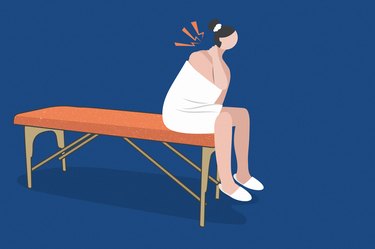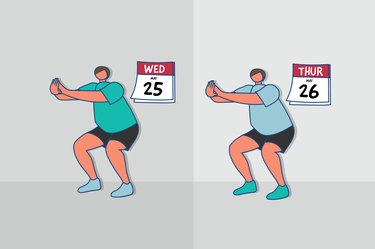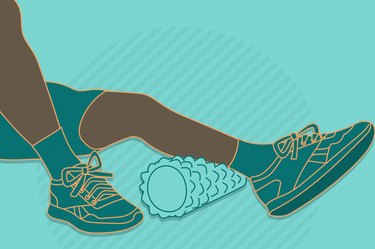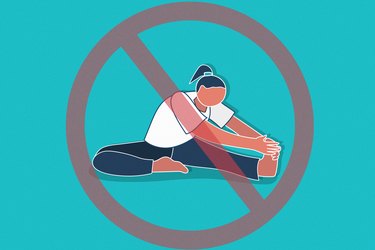
Getting a massage is often at the top of many people's self-care list. (Even the thought of lying down on that table under a warm blanket can cause your muscles to relax.) It's all about releasing tension and loosening up those stiff parts of your body.
But what happens if you don't leave feeling loose, and instead feel exceptionally sore? Is it normal to feel sore after a massage?
Video of the Day
Video of the Day
Here, Hayley King, a licensed massage therapist and owner of Massage by Hayley in Chicago, shares whether it's OK to be sore after a massage, why it happens and if there's any way we can prevent and/or treat that post-massage soreness.
Why You Get Sore After a Massage
You may be wondering, "Isn't a massage supposed to relieve soreness?" Well, not all the time.
"Occasional soreness after a massage is not uncommon," King says.
That achy feeling is actually your body's natural response to the pressure applied to your muscle and fascia (the connective tissue that surrounds your organs, bones, muscles and other internal structures and holds them in place, per Johns Hopkins Medicine), particularly when the massage is deep, she adds.
As the knots in your muscles are released through different massage techniques, inflammation in your muscles can increase, which produces that achiness you may feel, King adds.
And if you exercise, this type of soreness may feel familiar to you. It's called delayed onset muscle soreness, or DOMS, King says. This type of soreness can be caused by a few different things, including exercise, inflammation, injuries and — you guessed it — massage, per the National Academy of Sports Medicine.
Post-massage soreness, in particular, is more likely to happen if you get a certain type of massage — like deep tissue or sports massage — or if you haven't had a massage in a while, King adds.
The soreness, however, should only last about a day or two, and it should feel mild. "[Soreness] should not feel severe, like 'can't move your body' sore," King adds. "You should be able to carry on with your daily activities."
If you're feeling extreme or really uncomfortable soreness after a massage, it's possible something went wrong in the session — like your therapist used too much pressure or their technique was off, King says.
How to Relieve Post-Massage Soreness
If you get sore after massages (or think you will after your next one), there are a few things you can do to treat post-massage soreness.
King recommends following the four "S's" to take care of your body after a massage. They are:
1. Sip (Stay Hydrated)
After your massage, make sure you're drinking plenty of water and eating water-rich foods like fruits and vegetables. There isn't necessarily a set amount recommended to drink after a massage, but grabbing a cup from the massage clinic or bringing a water bottle from home might help.
Overall, try to get 11.5 to 15.5 cups of water per day, through drinking or water-rich foods, according to the National Academies of Sciences, Engineering and Medicine.
2. Soak (Take a Bath)
There's no reason relaxation needs to end once you walk out of your massage.
To keep the peaceful vibes going, King recommends taking a bath, if you have the ability to do so. The heat from the warm water relaxes your muscles, dilates blood vessels to improve blood flow and is generally comforting, per the Cleveland Clinic. Basically, it should feel great on those sore muscles.
And while there's no physiological evidence that Epsom salts can work to speed up muscle recovery or relieve pain, they are harmless and sometimes give off a relaxing scent if they're sold pre-scented. Try adding them to your bath to see if they help you.
3. Stretch
After a massage, it may be helpful to stretch any areas that start to feel sore. This may include your neck, upper back, lower back or shoulders and arms. If you got a full-body massage, your legs may even feel sore.
You can search online for stretching videos to follow at home, or take inspiration from one of our stretching-related articles here.
4. Sleep
A night of good zzzs is beneficial to your overall health, including to your sore muscles.
In fact, one October 2021 review in the Journal of Science and Medicine in Sport found many potential positive links between sleep and exercise-related muscle injuries. While sleep in relation to sports performance is still an emerging field, promising research is continuing to be done.
Whether you've had a massage or not, it's advised to get at least seven hours of sleep per night, according to the Centers of Disease Control and Prevention (CDC).
Tip
King often tells her clients to spray lavender oil on their pillows before bed, to help them get into a relaxed state before falling asleep.
Can You Prevent Post-Massage Soreness?
If you've felt post-massage soreness after a session before and don't want it to happen again, King recommends a few things prior to getting your next massage:
- Ask for a Swedish massage: These massages are more focused on your relaxation and therapists use a gentler touch.
- Request lighter pressure: Often, before a service, your therapist will ask you to rate on a scale how much pressure you'd like. Opt for the lighter side.
- Speak up if you're in pain: If the pressure begins to feel too intense during your massage, don't hesitate to speak up and ask the therapist to go gentler, King says.
- Switch it up, if needed: "If a client asks for deep tissue and I feel like they are tensing up, I will use lighter pressure and add relaxation into the massage because that's what their body is asking for," King says. Just because you went in asking for a deep tissue doesn't mean you have to stick with it if it's not what you expected. You can stop in the middle and ask to transition to a Swedish massage.
When to See a Doctor
In most cases, post-massage soreness will go away on its own after a few days. That said, you should talk to your doctor if the soreness:
- Lasts more than a couple of days
- Is severe
- Keeps you from your normal day-to-day activities
And of course, if you feel extreme soreness with other symptoms like dizziness, weakness or a fever, call your doctor. You may be dealing with something unrelated to the massage.
So, How Bad Is It Really to Be Sore After a Massage?
Ultimately, it's not bad to be sore after a massage. In fact, it's relatively common, especially if you received a deep tissue or sports massage. This soreness is your body's natural response to the pressure applied during your session.
Post-massage soreness should go away after a day or two. If it is extreme or prevents you from doing your daily tasks, though, make an appointment with your doctor.
- National Academy of Sports Medicine: "Muscle Soreness & DOMS: How to Prevent & Treat Sore Muscles."
- National Academies of Sciences, Engineering and Medicine: "Report Sets Dietary Intake Levels for Water, Salt, and Potassium To Maintain Health and Reduce Chronic Disease Risk."
- Centers of Disease Control and Prevention: "Are You Getting Enough Sleep?"
- Instagram.com: "Hayley King, LMT"
- Johns Hopkins Medicine: "Muscle Pain: It May Actually Be Your Fascia"
- Cleveland Clinic: "Benefits of Hot Tubs"
- Journal of Science and Medicine in Sport: "How does sleep help recovery from exercise-induced muscle injuries?"
Is this an emergency? If you are experiencing serious medical symptoms, please see the National Library of Medicine’s list of signs you need emergency medical attention or call 911.



